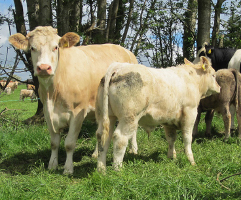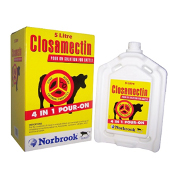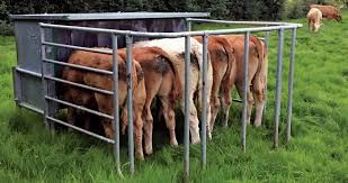Weaning stress has an adverse effect on the immune system, making calves more susceptible to disease, particularly pneumonia. It is often compounded by other husbandry practices occurring at the same time such as change of environment (outdoors to indoors), change of forage diet (from grass to silage), transport/selling, dehorning, castrating, etc.
 How can farmers optimise efficiency at weaning?
How can farmers optimise efficiency at weaning?
1) Parasite control – pre-housing dose
All parasites have a negative effect on the calves’ immune system and lungworm in particular can damage the lungs and increase the risk and severity of pneumonia. Treatment for lungworm ahead of housing allows time for dead worms to be coughed up. The benefit of this pre-housing dose is that all the worms can be removed from the animal, and the lungs can fully recover from the damage that the worms inflicted while they are still out in clean fresh air and under low stress.
Drummonds have a broad range of products, including drenches, pour – ons and injectable solutions. Please contact your local branch for assistance.
2) Control respiratory viruses – vaccination
Viruses such as RSV, Pi3 and IBR can act individually or in combination to cause significant lung and airway damage reducing the animal’s resistance to secondary bacterial infection. These three viruses are the most important primary pathogens. Once the viruses have caused the primary damage, the bacteria can enter as secondary invaders resulting in extensive damage to the lungs.
So, by protecting against the three key viruses, we can significantly reduce the number and severity of pneumonia outbreaks.
Vaccination offers protection but it takes from five days to up to six weeks to become established after the vaccines are used. Vaccine programmes should therefore be started in time before the period of stress like weaning or housing.
Vaccination plays an important role in protecting respiratory health; it shouldn’t however be viewed as the silver bullet to solving all health problems. Vaccination must therefore be combined with good farm management practices like those listed below:
3) Nutritional management prior to weaning
If possible, calves should be weaned outdoors in the best possible weather and start introducing concentrates to the calves at last one month prior to weaning. They should be consuming at least 1kg/day at weaning time and be fed concentrates after weaning.

4) Weaning procedure
Removing cows away from the group gradually causes less stress than taking away the calves. Up to a third of cows should be removed each time with a minimum interval of five days apart. Removed cows should be moved out of sight and sound from the remaining group.
5) Avoiding additional stressors
Procedures such as dehorning and castrating will increase stress around weaning time. These should therefore not be done at weaning.
Ideally, calves should be disbudded at an early age. If this has not been done early on, dehorning should be delayed to four weeks after weaning. Castration is best done in calves under six months-of-age or at least one month prior to weaning. If the weather allows it, it is good practice to delay the housing and selling of weaned calves for two to three weeks.
Nigel Scally Rathcoffey/Clonee 0873110772 or contact your local branch for assistance.

